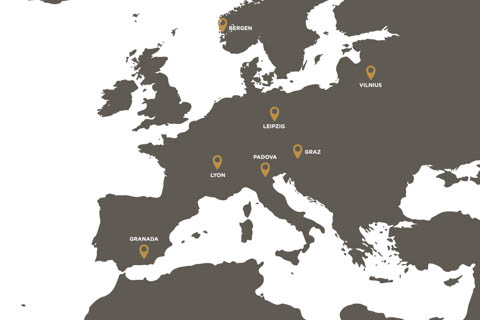|
Semester 1 Autumn |
| Compulsory Courses |
20.0 |
| Linguistic Pragmatics |
5.0 |
| Semantics |
10.0 |
| Trends in Contemporary Linguistics |
5.0 |
| Optional Courses |
10.0 |
| Authorship and 'the Author Question' in Literary Discourse |
5.0 |
| Cultural Studies |
5.0 |
| Current Approaches to Language Testing and Assessment |
5.0 |
| English Phonology |
5.0 |
| Literature and the Anthropocene |
10.0 |
| Media Discourse I/III p. |
5.0 |
| Media Discourse (Medialisation of Political Discourse) III/III p. |
10.0 |
| Postcolonial Studies and Literature |
5.0 |
| The Victorian Novel and its Contemporary Transformations |
10.0 |
| Theme of Madness in Literature |
5.0 |
| Theory of Language for Specific Purposes |
5.0 |
|
Semester 2 Spring |
| Compulsory Courses |
20.0 |
| Cognitive Linguistics |
5.0 |
| Corpus Linguistics and Phraseology |
10.0 |
| Methods of Scientific Research |
5.0 |
| Optional Courses |
10.0 |
| Brick, Stone and Water: The Body and the City |
5.0 |
| British Cultural Studies |
5.0 |
| Current Practices in Foreign Language Teaching and Learning |
5.0 |
| English Morphology and Syntax |
5.0 |
| Lost in AI Translation: Writing and Translating with Artificial Intelligence |
5.0 |
| Media Discourse II/III p. |
10.0 |
| Media Genre Typology and Production of Media Texts |
5.0 |
| Psycholinguistics |
5.0 |
| 20th Century Anglo-American Poetry: Authors, Movements and Modes |
5.0 |
| 20th Century English Novel: from Modernism to Postpostmodernism |
10.0 |
|
Semester 3 Autumn |
| Compulsory Courses |
20.0 |
| Critical Discourse Analysis |
5.0 |
| Linguistic Typology |
10.0 |
| Master's Thesis Seminar |
5.0 |
| Optional Courses |
10.0 |
| variant LINGUISTICS (you can choose subjects from any variant, regardless of your study program) |
10.0 |
| Academic Writing |
5.0 |
| Applied Linguistics (and a research project) |
10.0 |
| Baltic Onomastics |
5.0 |
| Contrastive Grammar |
5.0 |
| Contrastive Grammar |
5.0 |
| Contrastive Grammar of Lithuanian and Italian |
5.0 |
| Contrastive Grammar of the Baltic Languages |
5.0 |
| Current Approaches to Language Testing and Assessment |
5.0 |
| Digital Resources of the Baltic Languages |
5.0 |
| Effective Scientific Discourse |
5.0 |
| Etymology |
5.0 |
| Grammar Theory |
5.0 |
| Issues in Lexical Typology |
5.0 |
| Language and Culture |
5.0 |
| Language and Gender: From Grammar to Politics |
5.0 |
| Legal Argumentation |
5.0 |
| Linguistic Typology (and a research project) |
10.0 |
| Media Discourse I/III p. |
5.0 |
| Media Discourse III/III p. |
10.0 |
| Media Discourse (Medialisation of Political Discourse) III/III p. |
10.0 |
| Prussian Studies |
5.0 |
| Research on Old Lithuanian and Latvian Texts |
5.0 |
| Sociolinguistics |
10.0 |
| Terminology |
5.0 |
| variant LITERATURE AND CULTURE (you can choose subjects from any variant, regardless of your study program) |
10.0 |
| Ancient Metamorphoses in Modern Literature |
5.0 |
| Authorship and 'the Author Question' in Literary Discourse |
5.0 |
| Cultural Representations of Gender and Family |
5.0 |
| Cultural Studies |
5.0 |
| Editing Culture Texts |
5.0 |
| Experiential Learning and Applied Project |
5.0 |
| Experiential Learning and Research Project in Gender Studies |
5.0 |
| Hermeneutical Theory of Culture |
5.0 |
| Intertextuality: theory and practice |
5.0 |
| Islam and Christian Culture |
5.0 |
| James Joyce |
5.0 |
| Language and Thinking |
5.0 |
| Linguocultural Studies |
5.0 |
| Literature and the Anthropocene |
10.0 |
| Lithuanian Literature and Cultures of Memory |
5.0 |
| Methods in Literary Studies |
5.0 |
| Narratives of place and migration in the NBS region |
5.0 |
| Phenomenology I: The Basics of Phenomenology |
5.0 |
| Postcolonial Studies and Literature |
5.0 |
| Psychoanalytical Criticism of Art |
5.0 |
| The Arts of the Muses in Antiquity |
5.0 |
| The Great Shift? The Revival of Classical Antiquity in Italian Literature |
5.0 |
| The Victorian Novel and its Contemporary Transformations |
5.0 |
| Theme of Madness in Literature |
5.0 |
| variant TRANSLATION (you can choose subjects from any variant, regardless of your study program) |
10.0 |
| Computer-Aided Translation |
5.0 |
| Practical Rhetoric |
5.0 |
| Translation of Literary Texts II/II p. |
5.0 |
| Translation of Lithuanian Literature into English |
5.0 |
|
Semester 4 Spring |
| Compulsory Courses |
30.0 |
| Master Final Thesis (Study field: Philology by language) |
30.0 |


